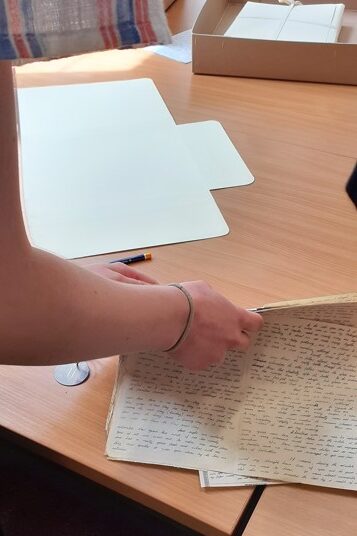For three weeks in July 2021 Dorset History Centre has hosted three students undertaking work experience. For obvious reasons, this year has been very different to previous years, with the students having to work remotely for large parts of their time, with the occasional day in the building learning about collections.
The students have written us a blog each on something they were involved with, as well as their perspectives on work experience in the age of Covid! This third blog is from Crystal Davies…
—
On 8th December 1993, Richard De Pyres interviewed Edna Bolton about her experience as an evacuee during the Second World War. This interview was conducted in Motcombe, where Edna was sent when she was around five years old. Edna tells her story of her experience as an evacuee, and helps us to gain more insight into how the war affected those living in the Dorset area. Oral histories are an important part of history, and it is useful to hear interviewee’s experiences first hand so that we can grasp the emotion and feeling through listening to them retelling their story.
The interview with Edna Bolton helps us to connect with our local history. By listening to Edna’s experience in Motcombe during the war, we can start to gain an understanding of what life was like there at the time, and how the war affected the village. When using the oral history to gain an understanding of Dorset history, we can also use other sources such as the WI war record book, which will enable us to gain a fuller picture of Motcombe’s war experience. Edna tells her story of being an evacuee in Motcombe, and provides an insight into her daily life and the struggles that were faced as a result of the war. Another useful aspect of listening to the interview is that it helps us to compare life today with the life of the past. Edna mentions ways of communicating back in the war, and it is interesting to learn how this differs to today’s methods of communication. Listening to Edna retell her story of being an evacuee, we can somewhat understand what it was like for her to live through the Second World War. It is interesting to hear someone retell their story themselves, and for Edna would have helped her to reconnect with her past.
Oral histories are an important way of documenting history. By interviewing those who lived through certain events, we can begin to add more depth to our understanding of the past. Not only do oral histories help us to make connections to the past, they also help the interviewee to reconnect with their past and keep their memories alive. Providing Edna with a platform to talk about her memories ensures that her experiences are not forgotten and that they contribute to our knowledge of historical events. Oral histories help to bring past events to life and as a result history becomes more accessible and events are more detailed than if they were not used.
—

During my time at Dorset History Centre, I have learned valuable skills and more about the importance of archives. It has been interesting to see how archives operate, and hear more about the important role they play in the community. Not only have I developed skills that will be important for my future, I have also learnt more about the past through various projects. Due to the Coronavirus, work experience was different than usual.
With a blended approach of some on-site activities and remote working, I can see how archives had to adapt because of the government restrictions. I have enjoyed my time working at the Dorset History Centre, and understand the importance of having a local archive. Luckily, technology has allowed us all to keep in contact over the past three weeks and the blended work experience approach did not hinder my experience and I thoroughly enjoyed the time I spent working on the projects, both on-site and remotely. Archival research will be a huge part of my final year dissertation, and my time spent working at Dorset History Centre will benefit me majorly, as I now understand how archives work and how to use them effectively!


